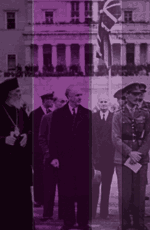

The new actualities
On 18 October 1944, as the last German troops left the Greek territory, the new Papandreou government, accompanied by British forces, arrived in Greece. The atmosphere of enthusiasm for the liberation temporarily overshadowed the mounting problems which the new government of national unity had to face - economic dislocation, massive material destructions and, above all, the unpredictable attitude of EAM/ ELAS and the division of the Greek population in two opposing ideological-political camps.
The British Prime Minister, Churchill was certain that, in the same way that his country wished to keep Greece firmly in the western bloc, the left-wing organisations in Greece would oppose the British military presence in the country for the exactly opposite reason. Furthermore, the fact that Papandreou headed the government of national unity did not satisfy the Greek left, which had repeatedly demanded his removal from the government in the past. Finally, after the cleansing of the Greek armed forces from its pro-EAM members in 1944, the execution of the agreement for the decommissioning of the weapons became even more complicated, as KKE did not wish to see a purely anti-communist army taking over under the instructions of General Scobie.